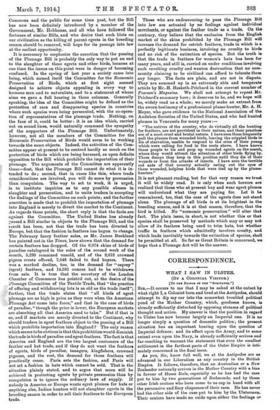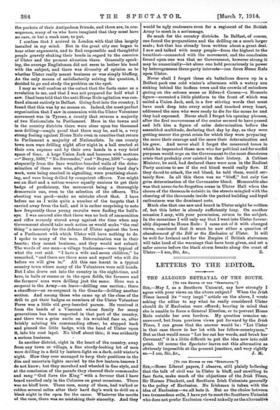CORRESPONDENCE.
WHAT I SAW IN ULSTER.
(BY A. COLONIAL VISITOR)
Eta vs. Bones Or Ism "Srscrnss."] Sts,—It occurs to me that I may be asked at the outset by what right I, a Colonist born and bred at the Antipodes, should attempt to dip my oar into the somewhat troubled political pond of the Mother Country, which, goodness knows, is already sufficiently disturbed by opposing streams of political thought and action. My answer is that the position in regard to Ulster has now become largely an Imperial one. It is no longer simply a question of domestic politics ; the present situation has an important bearing upon the question of Imperial defence; and its effect upon the Army, and to some extent even upon the Navy, is already sufficiently serious and far-reaching to warrant the statement that even the smallest settlement in the farthest parts of the Outer Empire is inti- mately concerned in the final issue. As you, Sir, know full well, we at the Antipodes are as advanced in our Liberalism as any country in the British Empire. It follows, therefore, that an Australian or a New Zealander naturally arrives in the Mother Country with a bias in favour of Home Rule, especially as he has bad the case put to him by two generations of Redmonds. and by those other Irish orators who have come to us cap in hand with all the persuasive and fiery eloquence of their race. He has never had the other side of the case put to him by the Ulstermen. Their orators have made no raids upon either the feelings or.
the pockets of their Antipodean friends, and there are, in con- sequence, many of us who have imagined that they must have no case, or but a weak case, to put.
I confess that I arrived in London with that idea largely installed in my mind. But in the great city one began to hear other arguments, and to find responsible and thoughtful people gravely shaking their heads in regard to the coercion of Ulster and the present situation there. Generally speak- ing, the average Englishman did not seem to bother his head with the subject, and there was diversity of opinion as to whether Ulster really meant business or was simply bluffing. As the only means of satisfactorily solving the question, I decided to go and study the problem on the spot.
1 may as well confess at the outset that the facts came as a revelation to me, and that I was not prepared for half what I saw. I had been told that the anti-Home Rule agitation was con- fined almost entirely to Belfast. Going first into the country, I found that this was by no means so. Indeed, the most perfect organization that I saw in connexion with the Ulster Volunteer movement was in Tyrone, a county that returns a majority of two Nationalists to Parliament. Here in the towns and in the country districts there were close upon ten thousand men drilling—ample proof that there may be, and is, a very strong feeling against Home Rule even in counties that return to Parliament a majority of Nationalists. In one county town men were drilling night after night in a hall erected at their own expense and by their own hands in a very brief space of time. A huge Union Jack and banners with mottoes —"Derry, 1689," "No Surrender," and " Boyne,1690 "—spoke eloquently from the bare weather-boarded walls of the deter- mination of these men who, after their ordinary bard day's work, were being coached in signalling, were practising shoot- ing, and were being drilled by competent officers. You might see an Earl and a cotton-weaver equally anxious to get their badge of proficiency, the movement being a thoroughly democratic one, even to the selection of the officers. The shooting was good—make no mistake about that. I have before me as I write quite a number of the targets that I carried away from the hall, and it is rather surprising to note bow frequently these young recruits were finding the bull's- eye. I was assured also that there was no lack of ammunition and rifles securely stored away against the time when any Government should take such action as would make "the real thing" a necessity for the defence of Ulster against the laws of a Parliament with which Ulster will have nothing to do. 1 spoke to many of the men. Determination was in their hearts ; they meant business, and they would not submit. The words of one man—a village tradesman—were typical of what the rest said. "I have a wife and seven children," be remarked, " and there are three sons and myself who will die before we will give in." All this one learnt in a typical country town where many of the Volunteers were mill hands. But I also drove out into the country in the night-time, and here, in halls or rooms or in the open fields, the farmers and the farmers' sons were drilling just the same. Here was a corporal in the Army—en leave—drilling one section ; there a chauffeur—an ex-sergeant in the Guards—drilling another section. And among those who came up at the close of the drill to get their badges as members of the Ulster Volunteer Force was a little old grey-bearded parson. He received it from the hands of a Viscount whose family for many generations has been respected in that part of the country, and there was a grim smile on his wrinkled face as, after briskly saluting his commanding officer, be stepped back and pinned the little badge, with the hand of Ulster upon it, into his coat lapel. No bluff about this; it was evidently a serious business.
In another district, right in the heart of the country, away from any town or village, a fine sturdy-looking lot of men were drilling in a field by lantern-light on a dark, cold winter's night. How they ever managed to keep their positions in the dim and uncertain lights carried by the few lantern-bearers I do not know ; but they marched and wheeled in fine style, and at the conclusion of the parade they cheered their commander and sang " God Save the King " with a fervour that I have heard excelled only in the Colonies on great occasions. There was no bluff here. These men, many of them, had walked or ridden several miles after their hard day's work to drill on a bleak night in the open for the cause. Whatever the merits of the case, there was no mistaking their sincerity. And they would be ugly customers even for a regiment of the British Army to meet in a scrimmage.
So much for the country districts. In Belfast, of course, one found the preparations and the drilling on a much larger scale ; but that has already been written about a great deaL I saw and talked with many people—from the highest to the humblest—connected with the movement, and the conclusion forced upon one was that no Government, however strong it may be numerically—let alone one held precariously in power by heterogeneous three-party interests—can force Home Rifle upon Ulster.
Never shall I forget those six battalions drawn up in a Belfast park one cold winter's afternoon with a watery sun sinking behind the leafless trees and the crowds of onlookers gazing on the solemn scene as Edward Carson—a Homeric figure—mounted a little platform to the front of which was nailed a Union Jack, and, in a few stirring words that must have sunk deep into every mind and touched every heart, addressed the men who were ready to die for the cause he and they had espoused. Never shall I forget his opening phrases, after the first nervousness of the orator seemed to have passed and left him a figure of calm determination before the assembled multitude, declaring that day by day, as they were getting nearer the great crisis for which they were preparing the more their courage and the more their determination and his grew. And never shall I forget the measured tones in which he impeached those men who for political and for sordid purposes would urge on the Government to the most disastrous crisis that probably ever existed in their history. A Cabinet Minister, he said, bad declared there were men in the Radical Party anxious to see if the red blood would really flow. If they dared to attack, the red blood, he told them, would cer- tainly flow. In all this there was no "bluff," but only the grim determination of the Covenanter blood. Memorable also was that never-to-be-forgotten scene in Ulster Hall when the cheers of the thousands outside in the streets mingled with the cheering of the thousands inside the packed building and loyal enthusiasm was the dominant note.
Much else that one saw and heard in Ulster might be written of, but this letter is already sufficiently long. On another occasion I may, with your permission, return to the subject. In the meantime I will only say that I went into Ulster favour- ably disposed to Home Rule : I came out of it with changed views, convinced that it must be now either a question of abandonment of the Bill or the Exclusion of Ulster. It will be well for Ireland and for the Empire if British statesmen will take heed of the warnings that have been given, and set a safer course before the black storm breaks along the coast of















































 Previous page
Previous page